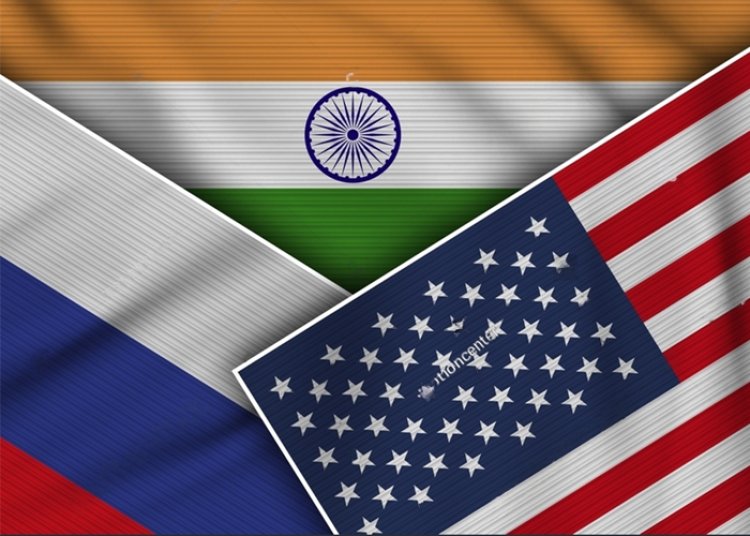The US-Russia-India geopolitics tangle
Explore the complexities of geopolitics in our blog post discussing the intricate relations and dynamics among the US, Russia, and India.

The US-Russia-India geopolitics tangle
Geopolitics examines how a country's land and people affect its governance and economy. It also concerns international relations. Oil and minerals can make some nations powerful. Countries with fewer goods may struggle. Geopolitics explains why nations differ and how they might cooperate.
Geopolitics examines geography and politics. It examines how geography affects political and economic development. Geopolitics also studies global politics and how nations interact. As the world becomes more interconnected and countries compete for power, this study is more essential.
Geopolitics is about understanding geography, resources, and power. A nation's topography affects its economics and politics. Oil, gas, and mineral-rich nations might become global leaders. Limited-resource countries may struggle to sustain economic and political dominance. Human geography also affects political development. Population density, cultural identity, and socioeconomic structures can influence a nation's politics.
Understanding violence, migration, and climate change requires geopolitics. Political, economic, and cultural tensions can cause international conflicts. Geopolitical analysis can explain and resolve these problems. Understanding how climate change affects resources and migration patterns might help create effective policy. Geopolitics helps us comprehend how our world is interconnected and how nations can cooperate to achieve goals.
US Geopolitics
The US Geopolitical Strategy protects, maintains, and promotes US interests worldwide. Because of oil, the US employs military force to achieve its goals and safeguard its interests in the Middle East. They seek greater markets for American goods and services. Knowing this helps you understand the world.
Geopolitics examines how geography, international power, and politics interact. It examines how geography affects international economic and political connections. Ancient fights for trading routes, natural riches, and strategic sites began geopolitics.
The US, China, and Russia compete geopolitically in the modern globe. US Geopolitical Strategy seeks global power domination, regional security, and global American interests.
With a huge network of alliances and bases, the US is the world's strongest military and economic force. Natural resources, commercial routes, military might, and ideology determine its geopolitical policy.
The Monroe Doctrine, Truman Doctrine, and Pivot to Asia plan are US geopolitical strategies. American geopolitics involves military intervention in other nations' affairs.
Military interventionism, or "big stick," is a longstanding US policy. To preserve its interests or promote democracy and human rights, the US engaged in Afghanistan, Iraq, Syria, and Libya.
The Middle East, home to half the world's oil reserves, is vital to US energy security. The US liberalizes markets in developing nations to expand its exports.
In conclusion, US geopolitical strategies use economic, diplomatic, and military means to retain American dominance. Natural resources, commercial routes, military strength, non-state players, new technology, and regional dynamics shape them.
International relations and political science students must understand American geopolitical strategies to understand the global system and its issues.
Russian geopolitics
Russia is a large nation with abundant oil and gas. They manipulate other nations with these resources. Russia influences events in several regions due to its military presence. Computers and misinformation are used to influence people's opinions. Russia undertakes these things to remain powerful and influential, but it sometimes upsets other countries.
Geopolitics examines global power dynamics. It explores how natural resources, borders, and climate affect political strategy. Russia has been using geopolitical methods to maintain its superpower status.
These policies ensure the country can influence regional and global issues. Russia uses geopolitical techniques to attain its foreign policy goals. Energy is a major geopolitical instrument. Europe and other countries rely on the country's oil and gas supplies.
Russia maintains its influence over its neighbors by establishing strong energy relations with them. Russia also uses its energy resources to negotiate political and economic concessions from other nations.
Russia also maintains a substantial military presence in important sites worldwide. As climate change opens the Arctic, Russia's military presence is growing.
In recent years, they have extended their military involvement in the Middle East, influencing the Syrian crisis. Russia can expand its influence and achieve its geopolitical goals by retaining this military presence. Finally, Russia uses information warfare geopolitically.
Cyberattacks and disinformation efforts are accused of influencing foreign politics. They've also been accused of interfering in international elections to influence politics in their favor. Russia can maintain its worldwide influence and project power through these initiatives.
Russia's geopolitical strategies aim to maintain its global powerhouse status. Russian foreign policy relies on energy, military presence, and media warfare. These tactics have helped Russia maintain its global influence.
These policies have also caused conflicts with other nations, particularly the US and Europe, who see Russia's actions as endangering global stability.
Indian geopolitics
India, a large country with several landforms and neighbors like Pakistan and China, must make crucial foreign policy decisions. It works with Russia, Japan, the US, and Australia to be safe and achieve solid trade deals. India must choose its allies carefully as it grows into a global power.
Geopolitics studies how geography, resources, and territory affect international politics. India's size and diversity have long influenced geopolitics.
India's geographical strategies shape its foreign policy, as it borders the Indian Ocean, the Himalayas, Pakistan, China, and Bangladesh. India's geopolitics are shaped by its neighbors.
Pakistan is its most important relationship. This alliance has shaped India's military and foreign policy, emphasizing defense and security. India's China policy depends on its cooperation with Russia.
India's military ties with Japan, the US, and Australia have grown as China's influence grows. India's geopolitical strategy is also influenced by its economic growth.
The country's growing economy and energy needs have focused attention on energy exporters like Iran, Saudi Arabia, and the UAE. India's geopolitics have also been shaped by its rapidly growing trade with China.
In conclusion, India's geopolitical strategy is complicated and influenced by its neighbors, economic growth, energy needs, and military alliances with major powers. As the country grows and gains global influence, its geopolitical strategy will change.
Geopolitical Disputes and Alliances
Countries can fight over territory or resources. China and Russia are becoming stronger, affecting international cooperation. Other alliances may emerge as NATO weakens. These changes must be monitored and addressed.
Geopolitics examines geography and politics. It examines how location, natural resources, and transportation routes affect a nation's politics and economy. International affairs now revolve around wars and alliances.
Resources, ideology, territorial disputes, and military clashes can cause geopolitical wars. With the development of global heavyweights like Russia and China and the decrease of Western dominance, geopolitics has grown more complicated.
These nations' expanding influence has intensified hostilities and alliances, shifting the global power balance. China's Belt and Road Initiative, which builds infrastructure throughout Asia, Europe, and Africa, has become a battleground between China and the US.
The US is actively countering China's aspirations to control global commerce. New alliances and weakened ties characterize the contemporary geopolitical context.
Founded during the Cold War to confront the Soviet Union, NATO now faces new challenges. NATO has increased its military presence in Eastern Europe due to Russian aggressiveness and the Crimea annexation. Brexit has damaged the EU's economic and political might.
The weakened EU may forge new coalitions to face external threats. International relations are shaped by wars and alliances.
New global power centers and political, social, and economic issues will disrupt the global balance of power, creating new geopolitical realities that will affect states worldwide. Keep track of these changes and execute measures to prevent geopolitical problems and exploit new alliance benefits in the contemporary era.
We hope this article may have helped you understand the foreign exchange market and trading. It is important that in this era of uncertainty, we all need a side hustle and income. Trading Forex is the best that it is. Please don't ever think of trading as gambling. Everyone can sing, but only a few can SING. It is a calling. For all those who want to make money in Forex trading without doing the deed of strenuous trading - CLICK HERE.
Happy Trading
To read more interesting articles CLICK HERE
Why do you need to be with TradeFxP? CLICK HERE
To join our Hunter AutoBot Trading Program CLICK HERE
All About TradeFxP's Hunter Ai EA Autobot CLICK HERE



 admin
admin 










